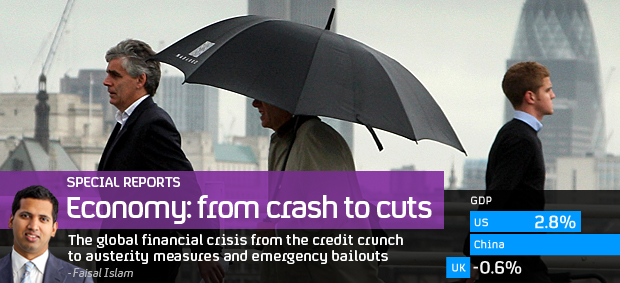Be bold to escape ‘peril’ – Cameron
Prime Minister David Cameron tells Europe it must be “bolder” and take difficult decisions in order to recover from its “perilous” economic state.
David Cameron did not use his speech at the 2012 World Economic Forum in Davos to make friends.
Instead, he warned world leaders, economists and business chiefs that now is the time to take some decisive action if they want to fix the ongoing eurozone crisis.
He told the gathering that Britain had made hard decisions to get its economy back on track, and now the eurozone had to take similar action. His speech comes after GDP figures on Wednesday showed that the UK economy shrank by 0.2 per cent in the last three months of 2011.
“We meet today at a perilous moment for economies right across Europe,” he said.
Europe’s lack of competitiveness remains its Achilles’ heel. Prime Minister David Cameron
“Growth has stalled. Unemployment is rising. The prospect of Europe getting left behind is all too apparent…So this is not a moment to try and pretend there isn’t a problem. Nor is it a moment to allow the fear of failure to hold us back. This is a time to show the leadership our people are demanding.
“Tinkering here and there and hoping we’ll drift to a solution simply won’t cut it any more. This is a time for boldness not caution. Boldness in what we do nationally – and together as a continent.”
He added: “Europe’s lack of competitiveness remains its Achilles’ heel.” He then went on to describe five European countries as less competitive than “sclerotic” Iran and called the plans for a financial transactions tax “madness”.
Instead, the prime minister gave a “checklist” of things the European Union should put in place to bring its member economies back from the brink, including testing all EU measures for their impact on growth; a target to reduce the overall burden of EU regulation; and a new “proportionality” test to prevent barriers to trade in services.
As well as these longer term growth strategies, the prime minister also urged “urgent short term measures” to fix market uncertainty, including recapitalising Europe’s banks, ending the uncertainty in Greece, and implementing the October agreement.
World trade
Mr Cameron also used the speech to urge Europe to explore the possibilities of free trade deals with other major trading blocs, such as the United States and Africa.
In the absence of a conclusion to the Doha free trade round, Mr Cameron proposed that a “coalition of the willing” could “forge ahead with more ambitious deals of their own.
And despite the controversy caused last year when the prime minister vetoed an EU treaty aimed at stabilising the euro, Mr Cameron said “nothing was further from the truth” than the suggestion that Britain was walking away from Europe.
He said: “Britain is part of the European Union. Not by default but by choice. It fundamentally reflects our national interest to be part of the single market on our doorstep and we have no intention of walking away.
“So let me be clear: we want Europe to be a success.”
But for this to happen, he concluded, boldness is key.
“There is nothing about the current crisis that we don’t understand. All these decisions lie in our own hands. The problems we face are man-made and with bold action and real political will we can fix them.”

